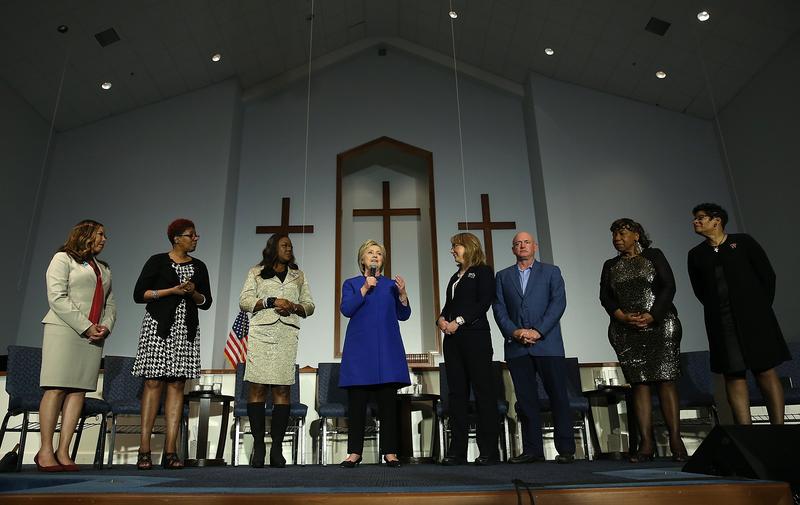
By now you've probably heard that Hillary Clinton is likely to do very well in South Carolina on Saturday, because she and Bill have such long-standing ties with the African American community, which makes up 55 percent of the Democratic electorate in South Carolina.
But certainly, among many communities, familiarity has not engendered a strong emotional connection. What's at play here, unusually for Clinton: a deep, longstanding, emotional connection.
You could see it this week, at the Brookland Baptist Church in West Columbia, SC. Clinton had just wowed an audience made up of members of Alpha Kappa Alpha, the nation’s oldest black sorority. For members of this group, like dance teacher Margarette Miller, even Clinton’s setbacks, like losing a presidential race, have been victories.
"The fact that she didn’t win," Miller said, "didn’t keep her from moving forward. She said she was willing to work and she rolled up her sleeves and that’s what she’s done."
I first saw this phenomenon in 2000 when Hillary Clinton was running for U.S. Senate. It was two days before an Election Day with an uncertain outcome, at the Love Fellowship Tabernacle Church, in Brooklyn. Pastor Hezekiah Walker had brought the crowd to its feet, clapping, liberally peppering his speech, and Clinton's, with "amens."
Clinton had started exploring a Senate run just months after her husband admitted having sex with a former intern. Hillary Clinton didn’t talk about the scandal much, but themes of trial, forgiveness, and redemption wafted through her campaign, nowhere more than in black churches. This was her 27th in two months.
"If I had not been a praying woman by the time I got into the White House I would have become a praying woman," Clinton said in an accent that can only be described as "full-Arkansas."
She then pivoted to a specific agenda that hasn't changed much over the years. "I can’t do any of it if I’m not there. I can’t try to improve the schools, keep the economy going, make health care accessible, make sure we end racial profiling, that we get the guns out the hands of children and criminals."
The applause was as long and sustained as any she'd had that campaign. And that connection persists to this day. A Stanford/ University of Oklahoma study released this month created a “feeling thermometer.” African Americans rated Clinton 14 points more warmly than they did Bernie Sanders. Among women, the gap grows.
Columbia Mayor Stephen Benjamin, who is President of the African American Mayors Association, explained the appeal. "I mean, she has been consistently in the public eye and consistently taken -- not jabs -- but strong punches," Benjamin said. "And she’s just proven that she’s a tough lady."
To be sure, for many black intellectuals that “affection narrative” is deeply flawed.
Michelle Alexander, a law professor and author of the New Jim Crow, recently wrote in The Nation: “It seems that we — black people — are her winning card, one that Hillary is eager to play. And it seems we’re eager to get played. Again.” Alexander said, yes, the Clintons can rise in black churches for “Lift Every Voice and Sing.”
But she argued both Clintons supported two bills that have overwhelmingly harmed African Americans: the Violent Crime Control Act of 1994, which led to high rates of incarceration, and the Welfare Reform bill of 1996, which Alexander said drove blacks into poverty. (Hillary Clinton has both acknowledged, and vowed to address, the wrenching outcome of the crime bill, and has recently promised to address some of the welfare bills' worst effects, most notably a five-year time limit.)
But Bernie Sanders has been pressing the welfare bill critique this week in South Carolina.
"What welfare reform did, in my view, was to go after some of the weakest and most vulnerable people in this country,” he said at a Columbia, S.C., press conference. "Secretary Clinton at that time had a very different position on welfare reform. She strongly supported it and worked hard to round up votes for its passage."
Sanders' no-compromise approach has won him endorsements from the intellectuals Cornel West and Ta-Nehisi Coates, and from Ben Jealous, former director of the NAACP, who recently accompanied Sanders to South Carolina.
But Clinton is touring the state with an entourage of her own, five mothers of victims of race-based violence, including Eric Garner and Sandra Bland. At a gathering at Central Baptist Church this week, tears and sighs were audible. Even Clinton could barely speak after listening to Sabryna Fulton, the mother of Florida teenager Trayvon Martin, slain by a neighborhood vigilante.
"Each one of us had a tragic story about ours son or daughter, murdered in senseless gun violence," Fulton said, of an earlier meeting with Clinton. "We poured out our heart, where no other candidate would listen to us," Fulton said, pausing to collect herself. "Miss Clinton did."
Like the other mothers, Fulton said she wasn't into politics, until now. "Because I feel that if she can stand up against all the men that she has to go up against, then I can too."
Amen, the mothers said. Amen.
(Note: this story was modified. Clinton performs more warmly among black voters on in the Stanford/University of Oklahoma study than Sanders does, not compared to white voters.)
